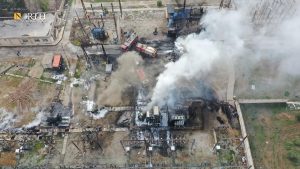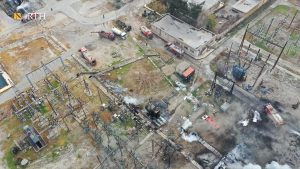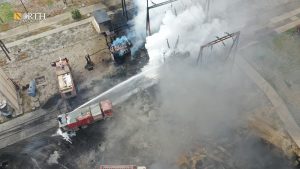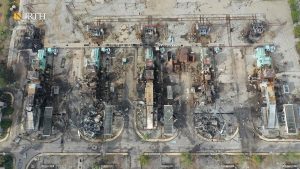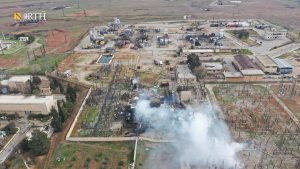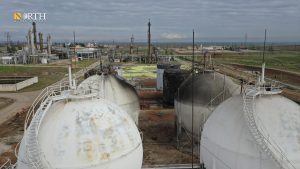By Zana al-Ali
RAQQA, Syria (North Press) – Areas of northern and northeastern Syria, from Derik (al-Malikiyah) in far northeastern Syria to Kobani in the north, are now covered in darkness, as most power stations are out of service due to the recent Turkish airstrikes on infrastructure facilities.
The widespread power outage has severely impacted the daily life of residents, as many of them are also experiencing water shortages since the pumping of water relies on electricity.
Turkish drones targeted with seven strikes the power plants in Kobani, Ain Issa, Amuda, Tirbe Spiyeh (al-Qahtaniya), Qamishli, and Derbasiyah . As a result, these stations went out of service, according to statistics released by the Autonomous Administration of North and East Syria (AANES) on Jan.15.
The airstrikes deprived 705 villages of electricity, as well as 70 percent of Qamishli and its countryside.
Turkey also carried out seven airstrikes on oil facilities. The targeted locations included the Sweidiya gas plant, the Awda oil field, Taflah Refinery station, and another oil facility in the village of Gire Pire near the town of Tirbe Spiyeh. Furthermore, warehouses used for oil field maintenance in northeastern Syria were also hit.
AANES efforts
Hussein Othman, Co-chair of the Executive Council of the AANES told North Press that the recent Turkish airstrikes against the AANES-held areas knocked the electrical substations out of service, but “the AANES will utilize its capabilities to restore power to the region’s residents.”
“This is the first time power substations and oil facilities are targeted with this intensity of airstrikes. It will have a negative effect on availability of petroleum products and liquid gas which are crucial for power-generating stations. It will greatly impact services in the future,” Othman said.
The co-chair pointed out that the AANES will follow two approaches to deal with the situation: diplomacy and on-the-ground action.
“Diplomatically, we will file complaints, document these violations and send them to international entities as well as the key actors and guarantor states in Syria, represented by the U.S.-led Global Coalition and Russian forces,” the official said.
“As for the service-oriented approach we will make significant efforts in the coming period. We will work diligently and utilize all our resources to provide and restore minimum level of basic services. We will work according to available resources to deliver the minimum level of required services,” he noted.
Diplomatic means
Regarding the AANES’s efforts to find a mechanism to halt Turkish attacks, the official said, “We are working diplomatically to put an end to these attacks. Furthermore, our forces, the Syrian Democratic Forces [SDF], have the legitimate right to self-defense and will fulfill their duty to protect the region in the future.”
Bassam Ishaq, representative of the Syrian Democratic Council (SDC) in the United States, believes that the most effective available method to stop Turkish bombardment is to convince the U.S. in international political forums that Turkey has lost credibility.
In an interview with North Press, he pointed out that this is clear in the double standards of Turkish President Recep Tayyip Erdogan, who condemned the Israeli strikes on infrastructure in Gaza, considering them a violation of human rights and international law, while simultaneously engaging in similar actions in northeastern Syria.
Ishaq emphasized the need for the AANES to keep shedding light on Turkish violations in Washington. It is crucial to stop these violations as they directly harm U.S. interests in the region, whether in combating terrorism or U.S.’ geopolitical interests in the Middle East.


